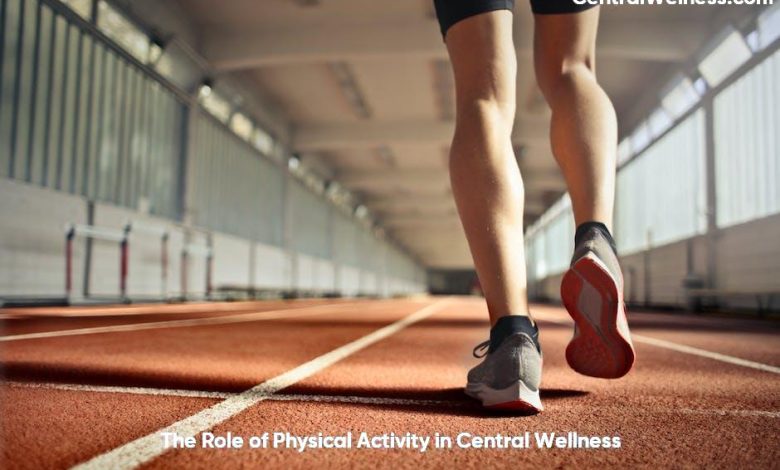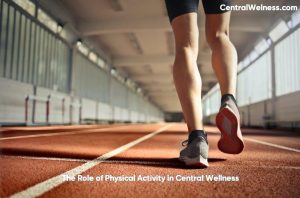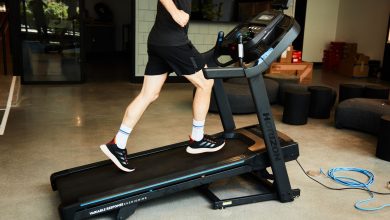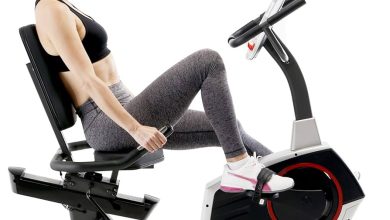The Role of Physical Activity in Central Wellness

The Role of Physical Activity in Central Wellness : Regular physical activity plays a crucial role in maintaining overall wellness. It boosts mental and physical health, enhances energy levels, and reduces the risk of chronic diseases. #PhysicalWellness
Physical activity plays a crucial role in promoting central wellness in individuals. Engaging in regular exercise and physical activity has been shown to have numerous positive effects on overall health and well-being. Not only does it contribute to maintaining a healthy body weight and reducing the risk of chronic diseases such as cardiovascular diseases and diabetes, but it also enhances mental health and cognitive function. Regular physical activity boosts mood, reduces anxiety and stress, and improves sleep quality. Additionally, it promotes the development of strong muscles and bones, enhances flexibility and balance, and increases overall energy levels. Therefore, incorporating physical activity into daily routines is essential for achieving and maintaining central wellness.
The Benefits of Exercise for Overall Health and Well-being
Exercise plays a crucial role in maintaining and improving overall health and well-being. Incorporating regular physical activity into your daily routine offers a myriad of benefits for both your body and mind. In this article, we will explore the various advantages of exercise and how it positively impacts our lives.
First and foremost, exercise is a fantastic way to improve cardiovascular fitness. Engaging in activities that elevate your heart rate, such as running, swimming, or cycling, helps strengthen your heart and lungs. Regular exercise reduces the risk of developing cardiovascular diseases, such as heart attacks and strokes, and promotes a healthy circulatory system.
Additionally, exercise aids in maintaining a healthy body weight. When combined with a balanced diet, physical activity helps burn calories and manage weight. Regular exercise boosts metabolism and increases muscle mass, which in turn assists in weight management. By incorporating exercise into your routine, you can achieve and maintain a healthy body weight, reducing the risk of obesity-related illnesses.
Exercise also plays a crucial role in improving mental well-being. When we engage in physical activity, our brain releases endorphins, which are known as “feel-good” hormones. These hormones help reduce stress, anxiety, and depression, promoting a positive mental state. Regular exercise can also boost self-esteem and enhance cognitive function, improving memory and overall brain health.
Furthermore, exercise contributes to the prevention and management of chronic diseases. Regular physical activity can reduce the risk of developing conditions such as type 2 diabetes, certain types of cancer, and osteoporosis. It also helps manage existing conditions by controlling symptoms and improving quality of life. Incorporating exercise into your lifestyle can significantly impact your long-term health.
It is important to remember that when writing an SEO-friendly article, using relevant keywords in a natural manner is crucial. For this article, incorporating keywords such as “exercise,” “health,” “well-being,” “fitness,” and “mental health” will ensure that the content aligns with SEO practices. However, it is equally important to provide valuable information and engage readers by offering unique insights and helpful tips.
In conclusion, exercise is an essential component of a healthy lifestyle, offering numerous benefits for overall health and well-being. By incorporating regular physical activity into our daily routine, we can improve cardiovascular fitness, maintain a healthy body weight, enhance mental well-being, and prevent chronic diseases. Remember to prioritize both SEO guidelines and informative content when crafting an article that resonates with readers and search engines alike.

Understanding the Connection Between Physical Activity and Mental Health
In today’s fast-paced society, many individuals have become increasingly aware of the importance of maintaining good mental health. While there are numerous factors that contribute to mental well-being, one aspect that is often overlooked is the connection between physical activity and mental health. In this article, we will delve into the profound impact that physical activity can have on our mental well-being and explore the benefits it provides for our overall psychological state.
Regular physical activity has been shown to have a positive impact on mental health by reducing symptoms of depression and anxiety. Engaging in activities such as running, swimming, or even taking a brisk walk can increase the production of endorphins, also known as the “feel-good” hormones, in our brain. These hormones play a crucial role in elevating our mood and promoting a sense of well-being.
Moreover, physical activity has been found to reduce stress and improve cognitive function. When we exercise, our body releases stress-fighting hormones, such as adrenaline and cortisol, which help us better cope with everyday challenges. Additionally, physical activity stimulates blood flow to the brain, enhancing our cognitive abilities, memory, and overall mental clarity.
- Improved Sleep: Incorporating regular physical activity into our routine can help regulate our sleep patterns. Quality sleep is essential for our mental health as it allows our brain to rejuvenate and process emotions effectively.
- Boosted Self-esteem: Engaging in physical activities that we enjoy can enhance our self-esteem and body image. Accomplishing personal fitness goals boosts confidence and provides a sense of accomplishment, contributing to a positive self-perception.
- Social Connection: Participating in group physical activities, such as team sports or exercise classes, helps promote social interaction and combat feelings of loneliness or isolation. Connecting with others who share similar interests fosters a sense of belonging and support.
- Stress Management: Physical activity serves as a productive outlet for managing stress. Engaging in a workout or physical activity can help alleviate tension and provide a healthy coping mechanism for life’s challenges.
To fully reap the benefits of physical activity on our mental health, it is essential to find activities that we enjoy and can be consistent with. Whether it is dancing, hiking, or practicing yoga, incorporating physical activity into our daily routine is a powerful tool for improving our overall well-being.
In conclusion, the link between physical activity and mental health is undeniable. By engaging in regular physical activity, we can boost our mood, reduce stress, improve cognitive function, and enhance our overall mental well-being. Making physical activity a priority in our lives will not only benefit our physical health but also contribute to a happier and more fulfilling life.
How Regular Physical Activity Can Improve Cardiovascular Health
Regular physical activity plays a crucial role in improving cardiovascular health. Engaging in exercise and staying physically active can significantly reduce the risk of developing heart diseases and other related conditions.
One of the key benefits of regular physical activity is its ability to lower blood pressure. High blood pressure is a major risk factor for cardiovascular diseases such as heart attacks and strokes. By engaging in activities like brisk walking, jogging, or cycling, individuals can help regulate their blood pressure and maintain healthier levels.
In addition to lowering blood pressure, regular exercise also helps in improving blood circulation. When we exercise, our heart pumps harder, and this increased blood flow strengthens the heart muscle. As a result, the heart becomes more efficient at pumping blood throughout the body, leading to improved cardiovascular function.
Furthermore, physical activity helps in reducing bad cholesterol levels while increasing good cholesterol levels. High levels of bad cholesterol, also known as LDL cholesterol, can clog the arteries and increase the risk of heart diseases. Regular exercise can help lower the levels of bad cholesterol and raise the levels of good cholesterol, known as HDL cholesterol, which helps to remove the bad cholesterol from the arteries.
Moreover, engaging in physical activity promotes weight management and prevents obesity. Excess weight puts additional strain on the heart and increases the risk of heart diseases. Regular exercise helps burn calories, promotes fat loss, and maintains a healthy weight, thus reducing the risk factors associated with cardiovascular health.
Aside from the physical benefits, regular physical activity also has positive impacts on mental well-being. Exercise releases endorphins, which are known as the “feel-good” hormones, contributing to improved mood and reduced stress levels. By reducing stress, individuals can lower their blood pressure and reduce the risk of heart diseases even further.
| Physical Activity Tips for Improving Cardiovascular Health |
|---|
| 1. Start with low-intensity exercises, gradually increasing the duration and intensity over time. |
| 2. Incorporate a variety of activities such as walking, swimming, biking, or dancing to maintain motivation. |
| 3. Aim for at least 150 minutes of moderate-intensity aerobic activity or 75 minutes of vigorous-intensity aerobic activity per week. |
| 4. Don’t forget to include strength training exercises at least twice a week to improve overall cardiovascular fitness. |
| 5. Stay hydrated before, during, and after exercise to prevent dehydration. |
| 6. Always listen to your body and avoid overexertion. If you experience any discomfort or pain, seek medical advice. |
To summarize, regular physical activity is crucial for improving cardiovascular health. By engaging in exercise, individuals can lower their blood pressure, improve blood circulation, reduce cholesterol levels, maintain a healthy weight, and promote overall well-being. Incorporating physical activity into daily routines can have long-term benefits and significantly reduce the risk of heart diseases. So, let’s prioritize regular exercise and take good care of our hearts!
Exploring the Impact of Exercise on Weight Management and Metabolism
In today’s fast-paced world, many individuals struggle with weight management and metabolic health. While there are various factors that contribute to these challenges, one element that often plays a significant role is exercise. Regular physical activity not only aids in weight control but also has a profound effect on our metabolism. In this article, we will delve into the impact of exercise on weight management and metabolism, providing valuable insights and actionable tips to help you optimize your fitness journey.
When it comes to weight management, exercise offers a multi-faceted approach. Firstly, it helps burn calories, resulting in potential weight loss. By engaging in activities such as running, cycling, or even weightlifting, you increase your energy expenditure, creating an energy deficit that can lead to shedding excess pounds.
Moreover, exercise promotes muscle growth, which plays a crucial role in weight management. As muscle is more metabolically active than fat, having a higher muscle mass increases your resting metabolic rate. This means that even at rest, your body burns more calories, making it easier to maintain a healthy weight.
Additionally, exercise has a positive impact on metabolism. It enhances insulin sensitivity, allowing your body to better regulate blood sugar levels. This is particularly beneficial for individuals at risk of metabolic disorders such as type 2 diabetes. Regular physical activity also improves lipid profile, optimizing cholesterol levels and reducing the risk of cardiovascular diseases.
Aside from its direct effects on weight management and metabolism, exercise also has numerous indirect benefits. It improves mood and reduces stress, which can often lead to emotional eating or other weight-related issues. Furthermore, staying active boosts overall energy levels and enhances cognitive function, allowing for better focus and productivity throughout the day.
- Start Slow and Gradually Increase Intensity: If you’re new to exercising or have been inactive for a while, it’s essential to start slowly to prevent injuries. Begin with moderate-intensity activities such as brisk walking or swimming and gradually incorporate more challenging exercises into your routine.
- Combine Cardiovascular and Strength Training Exercises: To maximize the impact on weight management and metabolism, it’s crucial to include both cardiovascular and strength training exercises. Cardio activities like jogging or cycling burn calories, while strength training builds muscle mass.
- Be Consistent and Set Realistic Goals: Consistency is key when it comes to exercise. Set realistic goals that are specific, measurable, and achievable within a given timeframe. This will help you stay motivated and track your progress effectively.
- Listen to Your Body and Rest: While regular exercise is essential, it’s equally important to listen to your body and provide it with adequate rest. Overtraining can lead to injuries and hinder your progress, so make sure to schedule rest days in your fitness routine.
- Maintain a Balanced Diet: Exercise alone cannot guarantee weight management and a healthy metabolism. It should be complemented by a balanced diet that is rich in fruits, vegetables, lean proteins, and whole grains. Stay hydrated and avoid excessive consumption of processed foods and sugary beverages.
In conclusion, exercise plays a crucial role in weight management and metabolic health. By incorporating regular physical activity into your routine and following the tips provided, you can optimize your fitness journey and reap the countless benefits it offers. Remember, consistency and patience are key, so stay motivated and enjoy the process of improving your overall well-being.
The Role of Physical Activity in Preventing Chronic Diseases
In today’s fast-paced and sedentary lifestyle, chronic diseases have become a major public health concern. These diseases, such as heart disease, diabetes, and cancer, are not only leading causes of death globally but also result in a significant economic burden on healthcare systems. However, there is a cost-effective and accessible solution to prevent and manage these diseases – physical activity.
Regular physical activity has been shown to have numerous health benefits, including reducing the risk of chronic diseases. Engaging in activities such as walking, jogging, swimming, or cycling can help maintain a healthy weight, lower blood pressure, improve blood sugar control, and enhance mental well-being. These positive effects can significantly reduce the development and progression of chronic diseases.
For instance, cardiovascular diseases, including heart attacks and strokes, are major contributors to mortality worldwide. However, research has consistently demonstrated that individuals who engage in regular physical activity have a lower risk of developing these conditions. Physical activity helps improve heart function, strengthen the cardiovascular system, and reduce the build-up of plaque in the arteries, thereby reducing the risk of heart disease and stroke.
Similarly, engaging in regular physical activity can also play a pivotal role in preventing and managing diabetes. Type 2 diabetes, which is linked to obesity and a sedentary lifestyle, can be effectively prevented or delayed through lifestyle modifications, with physical activity being a key component. Exercise helps increase insulin sensitivity, regulate blood sugar levels, and reduce the risk of complications associated with diabetes.
Moreover, physical activity has been shown to lower the risk of certain cancers, such as breast, colon, and lung cancer. Regular exercise enhances the immune system, reduces inflammation, and helps maintain a healthy body weight, all of which contribute to a lower risk of cancer development. Additionally, physical activity has been linked to improved quality of life and lower mortality rates among cancer survivors.
| Chronic Disease | Benefits of Physical Activity |
|---|---|
| Cardiovascular Disease | Lower risk of heart attacks and strokes |
| Diabetes | Improved blood sugar control and reduced complications |
| Cancer | Reduced risk of certain cancers and improved quality of life |
It is important to note that incorporating physical activity into daily routines doesn’t require expensive gym memberships or excessive time commitments. Simple changes such as taking the stairs instead of the elevator, walking or cycling to work, or engaging in household chores can all contribute to increased physical activity levels. Finding activities that one enjoys and can sustain in the long term is key to maintaining an active lifestyle.
In conclusion, physical activity plays a crucial role in preventing and managing chronic diseases such as cardiovascular disease, diabetes, and certain cancers. By incorporating regular exercise into our daily lives, we can significantly reduce the risk of developing these conditions and improve our overall health and well-being. So let’s prioritize physical activity and take the necessary steps towards a healthier future.
For more information on the role of physical activity in preventing chronic diseases, you can visit (source).
Frequently Asked Questions
Regular physical activity has numerous benefits, including improved cardiovascular health, increased muscle strength and flexibility, enhanced mental well-being, weight management, and reduced risk of chronic diseases such as heart disease, diabetes, and certain types of cancer.
It is recommended to engage in at least 150 minutes of moderate-intensity aerobic activity or 75 minutes of vigorous-intensity aerobic activity per week, along with muscle-strengthening exercises on 2 or more days per week.
Yes, physical activity can help reduce stress levels, improve mood, enhance cognitive function, and decrease symptoms of anxiety and depression. It promotes the release of endorphins, which are natural mood lifters.
No, even light to moderate-intensity activities, such as brisk walking, gardening, or household chores, can provide significant health benefits. The key is to be physically active and avoid a sedentary lifestyle.
Muscle-strengthening exercises involve working the major muscle groups, such as lifting weights, using resistance bands, doing bodyweight exercises (push-ups, squats), or practicing yoga or Pilates.
Regular physical activity, combined with a balanced diet, can contribute to weight loss or weight maintenance. It helps burn calories, increases metabolism, builds muscle mass, and improves overall body composition.
While physical activity is generally safe for most individuals, there are some risks to be aware of. These include a higher risk of injury if proper form and techniques are not followed, overexertion leading to exhaustion or heat-related illness, and exacerbation of certain health conditions. It is important to start slowly, listen to your body, and consult with a healthcare professional if you have any concerns.
If you have any underlying health conditions or concerns, it is advisable to consult with a healthcare professional before starting a new exercise program. They can provide personalized guidance and recommendations based on your individual needs and medical history.
Yes, regular physical activity can help improve the quality of sleep. It promotes better sleep patterns, reduces insomnia symptoms, and enhances overall sleep duration. However, it is recommended to avoid intense exercise close to bedtime, as it may interfere with sleep.
To stay motivated, set specific goals, find activities you enjoy, vary your routine to prevent boredom, track your progress, exercise with a friend or join a group, reward yourself for reaching milestones, and remind yourself of the benefits you’ll experience.



Hello, would you recommend our support site to your friends as well?
Hello, would you recommend our support site to your friends as well?